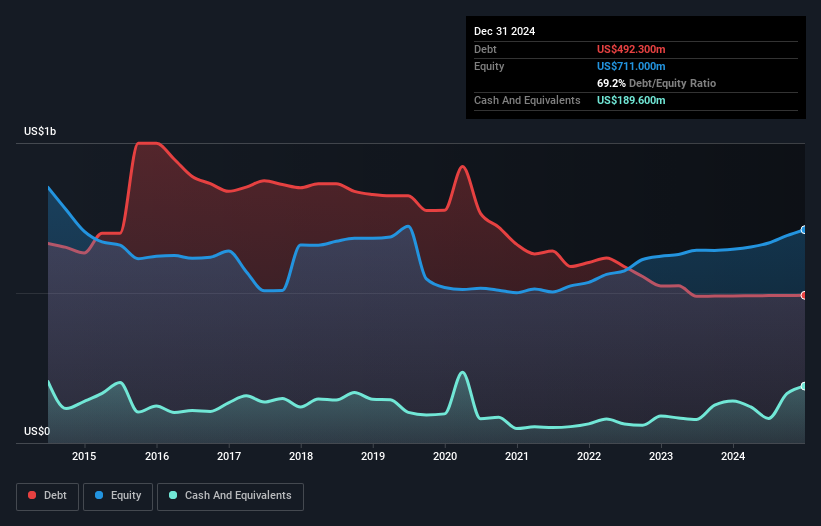Please use a PC Browser to access Register-Tadawul
SunCoke Energy (NYSE:SXC) Has A Pretty Healthy Balance Sheet
SunCoke Energy, Inc. SXC | 7.27 | -0.41% |
Some say volatility, rather than debt, is the best way to think about risk as an investor, but Warren Buffett famously said that 'Volatility is far from synonymous with risk.' So it seems the smart money knows that debt - which is usually involved in bankruptcies - is a very important factor, when you assess how risky a company is. As with many other companies SunCoke Energy, Inc. (NYSE:SXC) makes use of debt. But the real question is whether this debt is making the company risky.
Why Does Debt Bring Risk?
Debt assists a business until the business has trouble paying it off, either with new capital or with free cash flow. Ultimately, if the company can't fulfill its legal obligations to repay debt, shareholders could walk away with nothing. However, a more usual (but still expensive) situation is where a company must dilute shareholders at a cheap share price simply to get debt under control. Of course, the upside of debt is that it often represents cheap capital, especially when it replaces dilution in a company with the ability to reinvest at high rates of return. When we think about a company's use of debt, we first look at cash and debt together.
How Much Debt Does SunCoke Energy Carry?
As you can see below, SunCoke Energy had US$492.3m of debt, at December 2024, which is about the same as the year before. You can click the chart for greater detail. However, because it has a cash reserve of US$189.6m, its net debt is less, at about US$302.7m.

How Healthy Is SunCoke Energy's Balance Sheet?
Zooming in on the latest balance sheet data, we can see that SunCoke Energy had liabilities of US$205.8m due within 12 months and liabilities of US$751.4m due beyond that. On the other hand, it had cash of US$189.6m and US$96.6m worth of receivables due within a year. So its liabilities total US$671.0m more than the combination of its cash and short-term receivables.
This deficit is considerable relative to its market capitalization of US$698.4m, so it does suggest shareholders should keep an eye on SunCoke Energy's use of debt. Should its lenders demand that it shore up the balance sheet, shareholders would likely face severe dilution.
We use two main ratios to inform us about debt levels relative to earnings. The first is net debt divided by earnings before interest, tax, depreciation, and amortization (EBITDA), while the second is how many times its earnings before interest and tax (EBIT) covers its interest expense (or its interest cover, for short). Thus we consider debt relative to earnings both with and without depreciation and amortization expenses.
Looking at its net debt to EBITDA of 1.1 and interest cover of 6.6 times, it seems to us that SunCoke Energy is probably using debt in a pretty reasonable way. But the interest payments are certainly sufficient to have us thinking about how affordable its debt is. Also positive, SunCoke Energy grew its EBIT by 21% in the last year, and that should make it easier to pay down debt, going forward. There's no doubt that we learn most about debt from the balance sheet. But it is future earnings, more than anything, that will determine SunCoke Energy's ability to maintain a healthy balance sheet going forward. So if you want to see what the professionals think, you might find this free report on analyst profit forecasts to be interesting.
Finally, while the tax-man may adore accounting profits, lenders only accept cold hard cash. So the logical step is to look at the proportion of that EBIT that is matched by actual free cash flow. During the last three years, SunCoke Energy generated free cash flow amounting to a very robust 86% of its EBIT, more than we'd expect. That positions it well to pay down debt if desirable to do so.
Our View
Happily, SunCoke Energy's impressive conversion of EBIT to free cash flow implies it has the upper hand on its debt. But we must concede we find its level of total liabilities has the opposite effect. All these things considered, it appears that SunCoke Energy can comfortably handle its current debt levels. On the plus side, this leverage can boost shareholder returns, but the potential downside is more risk of loss, so it's worth monitoring the balance sheet. There's no doubt that we learn most about debt from the balance sheet. But ultimately, every company can contain risks that exist outside of the balance sheet.
When all is said and done, sometimes its easier to focus on companies that don't even need debt. Readers can access a list of growth stocks with zero net debt 100% free, right now.
This article by Simply Wall St is general in nature. We provide commentary based on historical data and analyst forecasts only using an unbiased methodology and our articles are not intended to be financial advice. It does not constitute a recommendation to buy or sell any stock, and does not take account of your objectives, or your financial situation. We aim to bring you long-term focused analysis driven by fundamental data. Note that our analysis may not factor in the latest price-sensitive company announcements or qualitative material. Simply Wall St has no position in any stocks mentioned.



